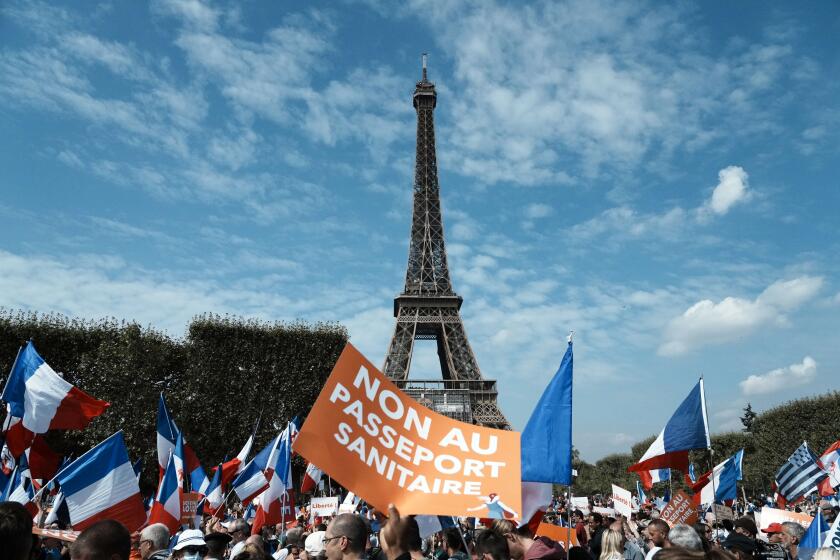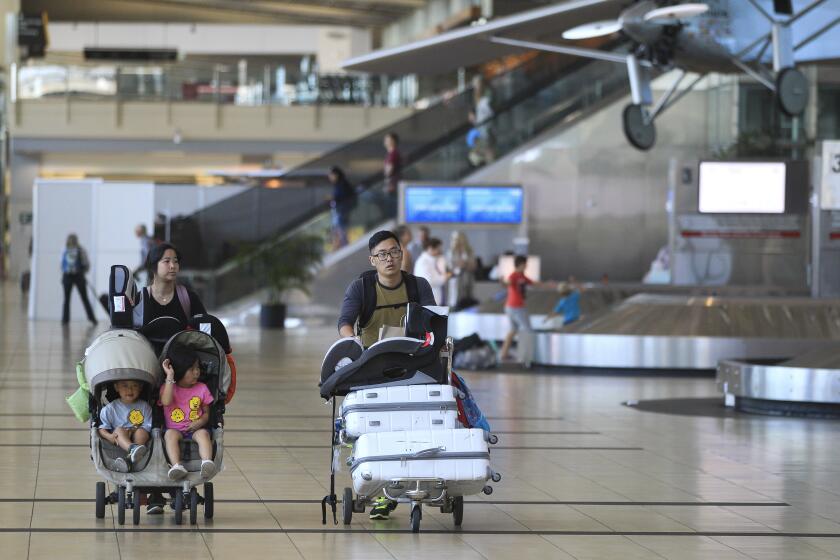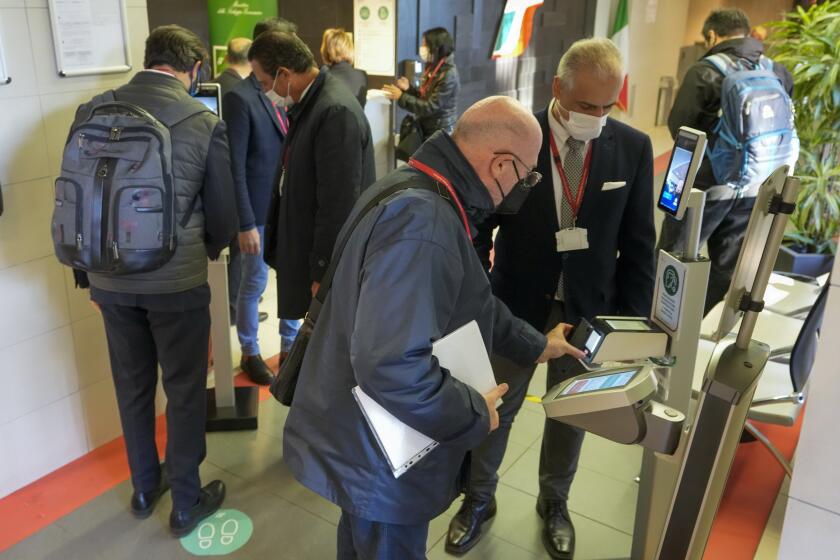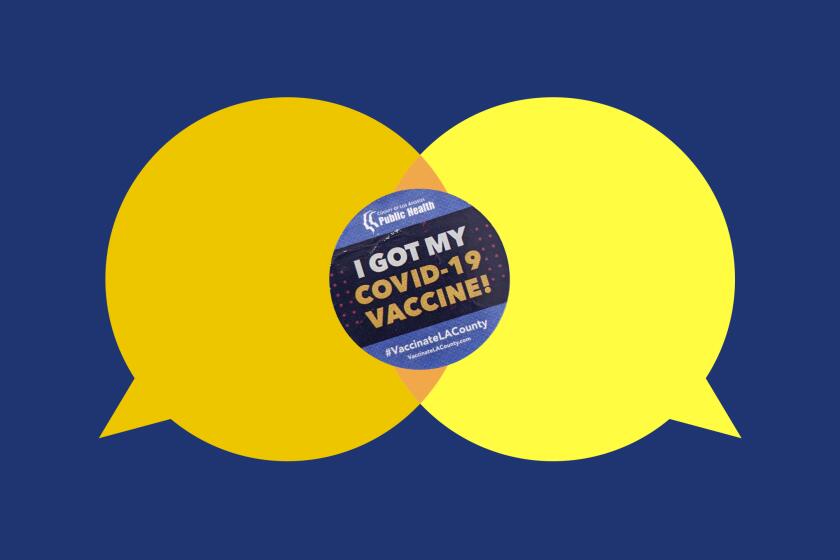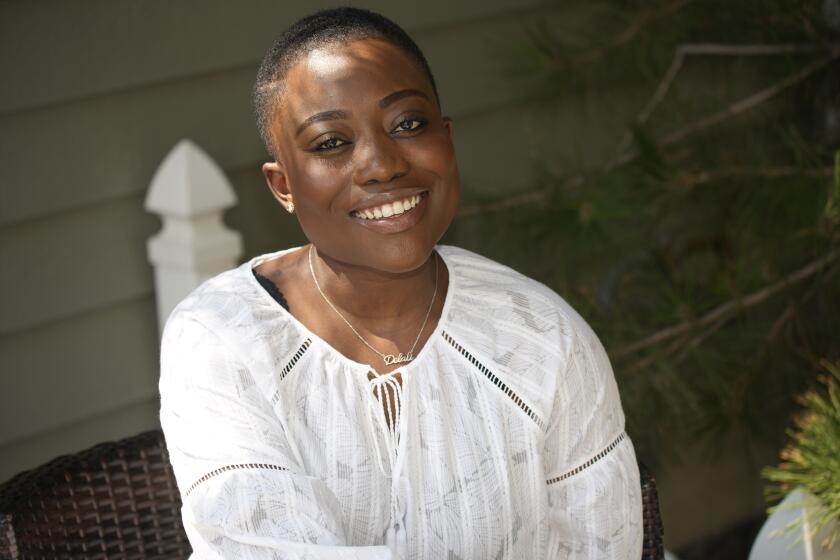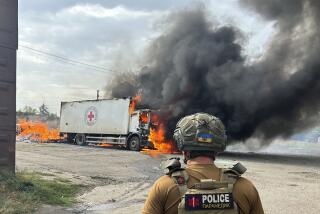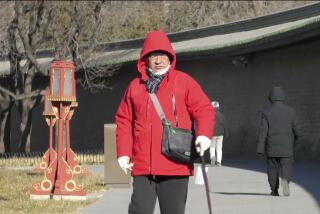‘On the verge of catastrophe’: Vaccine hesitancy fuels a COVID spike in Eastern Europe
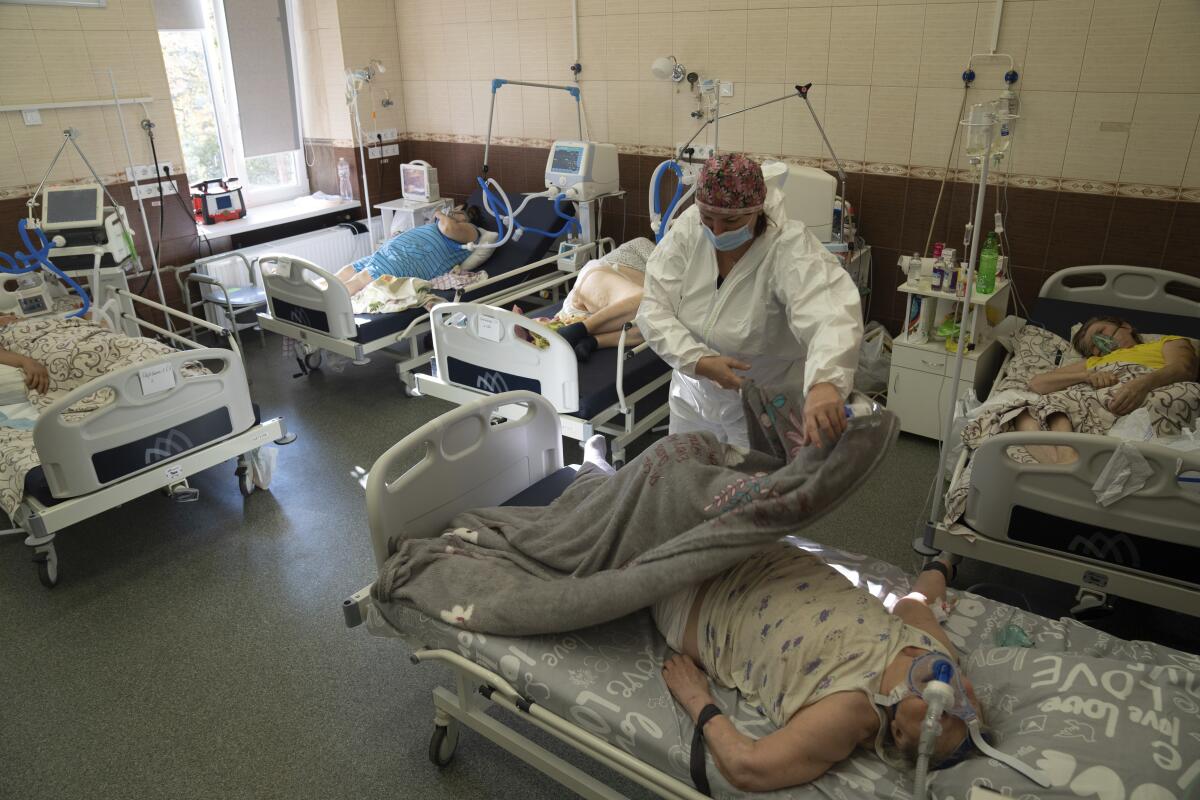
- Share via
KYIV, Ukraine — Truck driver Andriy Melnik never took the coronavirus seriously. With a friend, he bought a fake vaccination certificate so that his travel documents would appear in order when he hauled cargo to other parts of Europe.
His view changed after the friend caught COVID-19 and ended up in an intensive care unit on a ventilator.
“It’s not a tall tale. I see that this disease kills, and strong immunity wouldn’t be enough — only a vaccine can offer protection,” said Melnik, 42, as he waited in Kyiv, the Ukrainian capital, to get his shot. “I’m really scared, and I’m pleading with doctors to help me correct my mistake.”
Ukraine is suffering through a surge in coronavirus infections, as are other parts of Eastern Europe and Russia. While vaccines are plentiful, there is a widespread reluctance to get them in many countries — with notable exceptions including the Baltic nations, Poland, the Czech Republic, Slovenia and Hungary.
The slow pace of vaccinations in Eastern Europe is rooted in several factors, including public distrust and past experience with other vaccines, said Catherine Smallwood, the World Health Organization’s Europe COVID-19 incident manager.
“We’re seeing low vaccine uptake in a whole swath of countries across that part of the region,” she told the Associated Press. “Historical issues around vaccines come into play. In some countries, the whole vaccine issue is politicized.”
While not calling their restrictions mandates, some European countries are making life difficult for those without the COVID-19 vaccine.
Russia on Thursday recorded 1,159 deaths in 24 hours — its largest daily toll since the pandemic began — with only about one-third of the country’s nearly 146 million people fully vaccinated. The Kremlin ordered a national non-working period starting this week and lasting until Nov. 7.
An official in Hungary announced Thursday that private companies can require that employees get vaccinated to work, a measure that could boost the nation’s stagnant vaccination rate. Government employees, including teachers, will also be required to get vaccinated, the official said.
Poland on Thursday reported the highest number of daily new infections since May, with more than 8,000.
In Ukraine, only 16% of the adult population is fully vaccinated — the second-lowest proportion in Europe after Armenia’s rate of slightly more than 7%.
The U.S. will open its borders to vaccinated foreign travelers from Nov. 8, following similar moves by other countries around the world.
Authorities in Ukraine are requiring teachers, government employees and other workers to get fully inoculated by Nov. 8 or face a suspension in pay. In addition, proof of vaccination or a negative test is now needed to board planes, trains and long-distance buses.
This has created a booming black market in counterfeit documents. Fake vaccination certificates sell for the equivalent of $100 to $300. There’s even a phony version of the government’s digital app, with bogus certificates already installed, said Mykhailo Fedorov, minister for digital transformation.
Last week, Ukrainian President Volodymyr Zelensky chaired a meeting on how to combat the counterfeits. Police suspect workers at 15 hospitals of being involved. They have opened 800 criminal cases into such fakes and deployed 100 mobile units to track down users, Interior Minister Denys Monastyrsky said. They even caught a former lawmaker with one last week.
Ukraine’s low vaccination rate has led to the rapid spread of COVID-19, putting new stress on the country’s already overworked healthcare system.
Italy’s new rule requiring employees to have a COVID-19 pass to access their workplaces is one of the strictest anti-coronavirus measures in Europe.
The hospital surgical ward in the town of Biliaivka, near the Black Sea port of Odessa, is now treating only COVID-19 patients, with 50 of its 52 beds filled. Drugs and oxygen are in short supply.
“We are on the verge of catastrophe, pushed by aggressive opponents of vaccination and the lack of funds,” said Dr. Serhiy Shvets, the head of the ward. “Regrettably, five workers in my ward have quit over the past week.”
The situation looks similar at a 120-bed hospital in the western city of Chernivtsi, where Dr. Olha Kobevko, an infectious-disease specialist, said she has 126 patients in grave condition.
“I’m weeping in despair when I see that 99% of patients in serious condition with COVID-19 are unvaccinated, and those people could have protected themselves,” Kobevko told the AP. “We are left struggling to save them without sufficient drugs and resources.”
She blames widespread vaccine skepticism, influenced by social media and religious beliefs.
“Fake stories have spread widely, making people believe in microchips and genetic mutations,” Kobevko said. “Some Orthodox priests have openly and aggressively urged people not to get vaccinated, and social networks have been filled with the most absurd rumors. Ukrainians have learned to distrust any authorities’ initiatives.”
Vaccine hesitancy exists even among medical workers. Health Minister Viktor Lyashko admitted that about half of Ukrainian medical workers are still reluctant to get them.
Murat Sahin, UNICEF representative in Ukraine, said false and misleading information about COVID-19 poses a growing threat. “The risks of misinformation to vaccination have never been higher — nor have the stakes,” he said.
You want them to get vaccinated. They don’t. Now what? Tips from experts to have a conversation that could possibly change their mind.
Similar skepticism has been seen elsewhere in Eastern Europe, fueled by online misinformation, religious beliefs, distrust of government officials and reliance on non-traditional treatments.
In Romania, where about 35% of adults are fully immunized, tighter restrictions took effect this week requiring vaccination certificates for many daily activities, such as going to the gym, the movies or shopping malls. There’s a 10 p.m. curfew, shops close at 9 p.m., bars and nightclubs are closed for 30 days and masks are mandatory in public.
So many are “afraid of the vaccines because of the immense [amount of] fake information that has flooded social media and TV,” said Dr. Dragos Zaharia of Bucharest’s Marius Nasta Institute of Pneumology.
“Every day, we see people arriving with shortness of breath, and most of them are feeling sorry for not being vaccinated,” he told the AP.
Social media influencers across the U.S. are being paid to try to change the minds of vaccination-averse people at a neighborhood level.
Bulgaria, which has only one-quarter of its adult population fully vaccinated, also reported record infections and deaths this week. According to official data, Bulgaria has had the highest COVID-19 fatality rate in the 27-nation European Union for the past two weeks, and 94% of those deaths were of unvaccinated people.
Only 33% of Georgia’s population has been fully vaccinated, although authorities launched a lottery with cash prizes for those getting shots. Dr. Bidzina Kulumbegov bemoaned the slow pace of vaccinations.
The government’s information campaign “was not designed according to the peculiarities of our country. The emphasis should have been done, for instance, on the Georgian Orthodox Church, because we have many instances when priests are saying that vaccination is a sin,” Kulumbegov said.
For Melnik, the Ukrainian truck driver, the fear of getting COVID-19 outweighed all other concerns.
“You can’t cheat this illness,” he said. “You can buy a counterfeit certificate, but you can’t buy antibodies. Ukrainians are slowly starting to realize there is no alternative to vaccination.”
More to Read
Sign up for Essential California
The most important California stories and recommendations in your inbox every morning.
You may occasionally receive promotional content from the Los Angeles Times.
